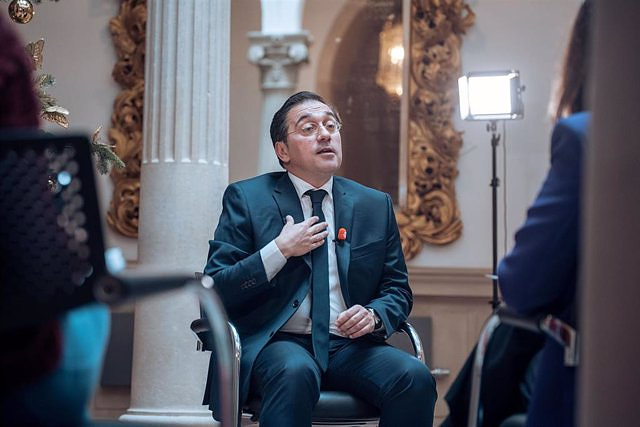The vice president of the country denounced "interference" by the investigation against senior officials for the alleged kidnapping of Spaniards
MADRID, 4 Ene. (EUROPA PRESS) -
The Ministry of Foreign Affairs has claimed the separation of powers in Spain after criticism from Equatorial Guinea for the investigation opened by the National Court against three senior officials in the country, one of them the son of President Teodoro Obiang, for the alleged kidnapping and torture of two Spanish citizens.
Diplomatic sources consulted by Europa Press have confirmed that the Spanish ambassador in Malabo, Alfonso Barnuevo, met on Tuesday with the Equatoguinean Foreign Minister, Simeón Oyono, but they did not wish to comment on whether said meeting was motivated by the news of the opening of the research.
The Government "is in contact with the Equatoguinean authorities at all times" since it is "a country to which we are linked by first-rate historical and cultural ties that we want to maintain to continue working for the well-being of the Equatoguinean population", they have pointed out the sources, stressing the importance of respecting "the separation of powers, fundamental in the constitutional system".
National Hearing Judge Santiago Pedraz is investigating Carmelo Ovono Obiang, son of the president and Secretary of State for Foreign Security in Equatorial Guinea; to Nicholas Obama Nchama, Minister of National Security; and the director general of Presidential Security, Isaac Nguema.
Pedraz has admitted for processing a complaint filed by the Movement for the Liberation of Equatorial Guinea Third Republic (MLGE3R), an opposition group to which the victims belonged. Specifically, the complaint focuses on the alleged kidnapping and subsequent torture suffered by four members of the MLGE3R: the residents of Spain Martín Obiang and Bienvenido Ndong and the Spanish nationals Feliciano Efa and Julio Obama Mefuman.
The four were captured in Juba, the capital of South Sudan, on November 15, 2019, and later flown on a presidential plane to Equatorial Guinea. Here, in addition to being tortured, they have been sentenced to long prison terms, 90 years in the case of Efa Mangue and 70 in the case of Obama Mefuman, for their alleged participation in an attempted coup.
After the investigation came to light, the Equatoguinean vice president and also the president's son, Teodoro Nguema Obiang, published a series of messages on Twitter denouncing that "Western justice is politicized to the bone" and criticizing Spain.
"I recommend to all the members of the Government of Equatorial Guinea, that they avoid traveling to the Kingdom of Spain so as not to be humiliated, because that European country does not want the prosperity of the Equatorial Guineans," said 'Teodorín', as he is popularly known, "only humiliate our country, commit interference and disrespect our sovereignty".
The Equatoguinean vice president claimed that "he has proceeded with all legality", claiming that there was a search and capture order against the Spaniards for "having attempted a coup d'état" in Equatorial Guinea and that the embassies had been asked to collaborate, including the from Spain.
Regarding the two imprisoned Spaniards, the diplomatic sources consulted have indicated to Europa Press that both the Embassy and the Consulate in Malabo are pending their case at all times and steps have been taken with the authorities for their protection.
Likewise, they have been provided with the consular assistance that their circumstances have allowed and their families are kept informed. Thus, the sources have taken the opportunity to "demand respect for Human Rights and public liberties in Equatorial Guinea."

 Exploring Cardano: Inner Workings and Advantages of this Cryptocurrency
Exploring Cardano: Inner Workings and Advantages of this Cryptocurrency Seville.- Economy.- Innova.- STSA inaugurates its new painting and sealing hangar in San Pablo, for 18 million
Seville.- Economy.- Innova.- STSA inaugurates its new painting and sealing hangar in San Pablo, for 18 million Innova.- More than 300 volunteers join the Andalucía Compromiso Digital network in one month to facilitate access to ICT
Innova.- More than 300 volunteers join the Andalucía Compromiso Digital network in one month to facilitate access to ICT Innova.-AMP.- Ayesa acquires 51% of Sadiel, which will create new technological engineering products and expand markets
Innova.-AMP.- Ayesa acquires 51% of Sadiel, which will create new technological engineering products and expand markets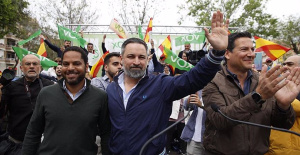 Abascal (Vox) criticizes that Sánchez is "victimizing" himself and calls for elections after his possible resignation
Abascal (Vox) criticizes that Sánchez is "victimizing" himself and calls for elections after his possible resignation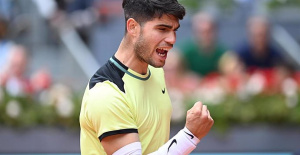 Carlos Alcaraz reaches the round of 16 in Madrid without breaking a sweat
Carlos Alcaraz reaches the round of 16 in Madrid without breaking a sweat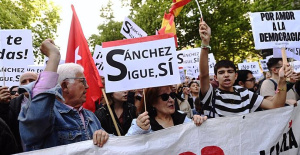 Some 5,000 people demonstrate in front of Congress for democracy, hours before Sánchez's decision
Some 5,000 people demonstrate in front of Congress for democracy, hours before Sánchez's decision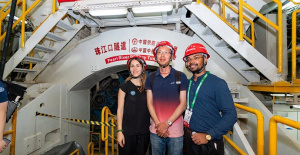 STATEMENT: Intelligent systems used in the construction of the deepest underwater tunnel in China
STATEMENT: Intelligent systems used in the construction of the deepest underwater tunnel in China How Blockchain in being used to shape the future
How Blockchain in being used to shape the future Not just BTC and ETH: Here Are Some More Interesting Coins Worth Focusing on
Not just BTC and ETH: Here Are Some More Interesting Coins Worth Focusing on UPV students build a prototype of a wooden house to move to Equatorial Guinea
UPV students build a prototype of a wooden house to move to Equatorial Guinea The UA opens the call for the Impulso 2024 Awards for the best innovative business initiatives
The UA opens the call for the Impulso 2024 Awards for the best innovative business initiatives ALI, virtual assistant from Alicante, internationally recognized by the OECD
ALI, virtual assistant from Alicante, internationally recognized by the OECD Retrópolis brings the golden age of video games and computing to the UPV
Retrópolis brings the golden age of video games and computing to the UPV A million people demonstrate in France against Macron's pension reform
A million people demonstrate in France against Macron's pension reform Russia launches several missiles against "critical infrastructure" in the city of Zaporizhia
Russia launches several missiles against "critical infrastructure" in the city of Zaporizhia A "procession" remembers the dead of the Calabria shipwreck as bodies continue to wash up on the shore
A "procession" remembers the dead of the Calabria shipwreck as bodies continue to wash up on the shore Prison sentences handed down for three prominent Hong Kong pro-democracy activists
Prison sentences handed down for three prominent Hong Kong pro-democracy activists ETH continues to leave trading platforms, Ethereum balance on exchanges lowest in 3 years
ETH continues to leave trading platforms, Ethereum balance on exchanges lowest in 3 years Investors invest $450 million in Consensys, Ethereum incubator now valued at $7 billion
Investors invest $450 million in Consensys, Ethereum incubator now valued at $7 billion Alchemy Integrates Ethereum L2 Product Starknet to Enhance Web3 Scalability at a Price 100x Lower Than L1 Fees
Alchemy Integrates Ethereum L2 Product Starknet to Enhance Web3 Scalability at a Price 100x Lower Than L1 Fees Mining Report: Bitcoin's Electricity Consumption Declines by 25% in Q1 2022
Mining Report: Bitcoin's Electricity Consumption Declines by 25% in Q1 2022 Oil-to-Bitcoin Mining Firm Crusoe Energy Systems Raised $505 Million
Oil-to-Bitcoin Mining Firm Crusoe Energy Systems Raised $505 Million Microbt reveals the latest Bitcoin mining rigs -- Machines produce up to 126 TH/s with custom 5nm chip design
Microbt reveals the latest Bitcoin mining rigs -- Machines produce up to 126 TH/s with custom 5nm chip design Bitcoin's Mining Difficulty Hits a Lifetime High, With More Than 90% of BTC Supply Issued
Bitcoin's Mining Difficulty Hits a Lifetime High, With More Than 90% of BTC Supply Issued The Biggest Movers are Near, EOS, and RUNE during Friday's Selloff
The Biggest Movers are Near, EOS, and RUNE during Friday's Selloff Global Markets Spooked by a Hawkish Fed and Covid, Stocks and Crypto Gain After Musk Buys Twitter
Global Markets Spooked by a Hawkish Fed and Covid, Stocks and Crypto Gain After Musk Buys Twitter Bitso to offset carbon emissions from the Trading Platform's ERC20, ETH, and BTC Transactions
Bitso to offset carbon emissions from the Trading Platform's ERC20, ETH, and BTC Transactions Draftkings Announces 2022 College Hoops NFT Selection for March Madness
Draftkings Announces 2022 College Hoops NFT Selection for March Madness